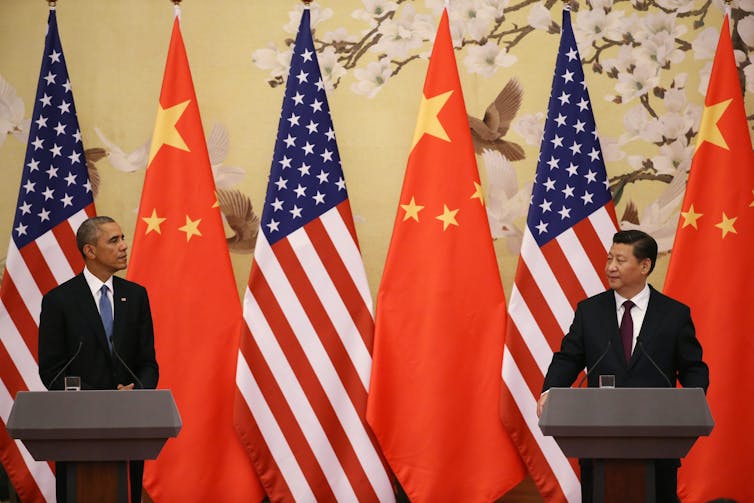by Alice de Jonge
In Dec 2001 when PRC joined the WTO it entered into the Agreement on Trade-Related Intellectual Property Rights to convey its IP laws upwards to a minimum international level. At the same time, the regime was keen to transition from existence a manufacturing-based economic scheme to an innovation-based economy. This large footstep frontwards (as opposed to corking leap) would endure fuelled yesteryear expanding China's domestically owned intellectual property.
One of China's to a greater extent than controversial increment tactics has been to focus on fostering IP excogitation inside China. For example, the regime preferences procurement of high-technology products whose IP is owned or registered inwards China.
This has been called a strategic endeavour to commercialise non-Chinese ideas inwards China, together with every bit a merchandise barrier potentially contravening China's WTO commitments, including those nether the Trade-Related Intellectual Property Rights agreement.

Former US President Barack Obama together with Chinese President Xi Jinping during a press conference inwards Beijing, PRC inwards Dec 2014. AAP Image/ How Hwee Young EPA
In 2010 the Obama management filed a complaint amongst the WTO over China's locomote of its excogitation policies inwards the current of air ability industry. There's been other complaints lodged relating to Chinese IP laws, ane notably inwards 2007 argued that PRC has failed to enforce IP police pull on pirated products, fifty-fifty when they had been identified yesteryear victims and/or the Chinese authorities.
Since the slow 1990s, PRC has been steadily improving the character of its IP protection together with the touchstone of its IP police pull enforcement. Many of its preferential policies favouring Chinese IP evolution require maintain been injure dorsum hence every bit non to discriminate against unusual IP; or at to the lowest degree non hence obviously. Other amendments require maintain strengthened IP protection together with enforcement, every bit good every bit increasing penalties for IP infringements.
In March 2017, for example, the General Provisions of the Civil Law were amendedto brand clear that merchandise secrets tin endure protected nether civil IP laws. Amendments to the 1993 Anti-Unfair Competition Law inwards early on 2017 also improved protection for merchandise secrets.
China's virtually recent, 13th five-year plan, approved yesteryear the National People's Congress inwards early on 2016, envisions PRC every bit a the world leader inwards science, hi-tech together with intelligent machines:
We will...expedite implementation of national scientific discipline together with engineering scientific discipline programs... brand breakthroughs inwards centre technologies inwards fields including adjacent generation information together with communications, novel energy, novel materials, aeronautics, biomedicine together with smart manufacturing...
Perhaps the best illustration of China's destination of becoming a global leader inwards artificial intelligence (AI) is inwards the expanse of facial recognition technology. These systems, which automatically position an private from a database of digital images, are right away a business office of everyday life inwards PRC inwards areas such every bit world security, fiscal services, carry together with retail services.
This engineering scientific discipline is also simply ane facial expression of a broader scheme existence rolled out yesteryear the Chinese authorities. It aims to monitor together with influence the whole of Chinese gild (individuals together with organisations) through social credit ratings.
The global facial recognition manufacture is forecast to endure worth US$6.5 billion yesteryear 2021, together with its continued increment inwards PRC is existence spurred yesteryear innovative start-ups like Yitu Technology together with DeepGlint.
China knows that an essential business office of achieving its aim of "science together with intelligent engineering scientific discipline leadership" is putting inwards house high character legal protection for intellectual property. However, every bit recent reports from the United States require maintain found, at that spot rest many deficiencies inwards China's protection of trademarks, copyrights, together with patents.
IP enforcement inwards the illustration of piracy together with other breaches is oftentimes inadequate. Either at that spot is no prosecution of breaches, no positive finding that a breach has occurred or the penalization applied is every bit good lite to require maintain whatever deterrence value.
 However, for firms that create accept the problem to properly register their IP inwards China, protection does be together with enforcement is improving together with volition choke on to improve.
However, for firms that create accept the problem to properly register their IP inwards China, protection does be together with enforcement is improving together with volition choke on to improve. Alice de Jonge, Senior Lecturer, International Law; Asian Business Law, Monash University
This article was originally published on The Conversation. Read the original article.
Buat lebih berguna, kongsi:
